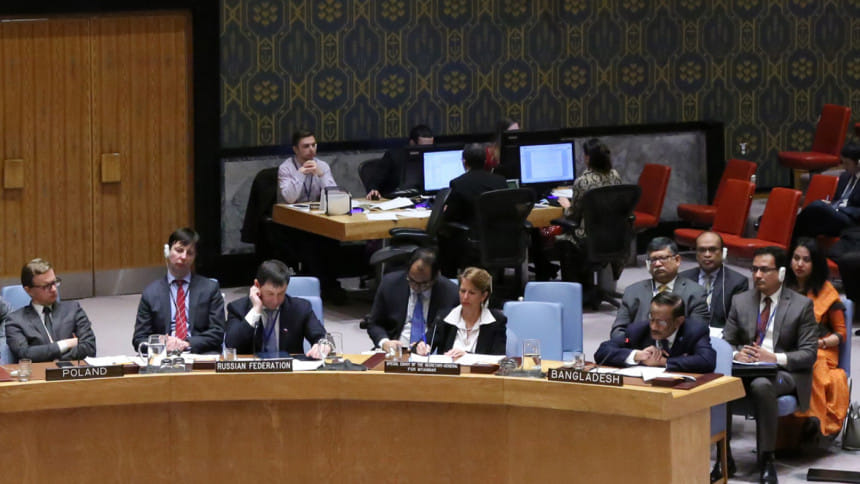Won't take any more Rohingyas

Bangladesh cannot accept any more refugees from Myanmar, Foreign Secretary Shahidul Haque told a UN Security Council meeting.
He also urged the UNSC to take a decisive action to create a conducive atmosphere in Rakhine for Rohingya repatriation.
"I regret to inform the council that Bangladesh would no longer be in a position to accommodate more people from Myanmar," he said.
The UNSC meeting on the situation in Myanmar was held at the UN Headquarters in New York on Thursday.
The secretary accused the Myanmar government of being obstructionist about bringing back more than one million Rohingyas who have fled violence amid brutal military crackdown in Rakhine in August 2017.
The UN says conditions in Myanmar are not yet right for the return of Rohingyas. Western powers at the council on Thursday lamented the lack of action from the Myanmar government.
Christine Schraner Burgener, UN secretary-general's special envoy on Myanmar, told the Security Council that the UN access was currently "insufficient". She also reported slow progress in efforts to help hundreds of thousands of Rohingya return home and warned that Myanmar's elections next year could worsen the crisis.
"While Bangladesh and host communities have been very generous, we cannot expect this to continue indefinitely," she said.
Peace remains fragile as Myanmar continues to wrestle with the legacy of decades of military rule and fundamental human rights issues, said a UN press release quoting Christine.
The Bangladesh foreign secretary further accused Myanmar of "hollow promises and various obstructionist approaches" during negotiations on returns, according to reports of AP, AFP, Reuters and others international media.
After a renewed flare-up in violence in Rakhine, new refugees are still crossing the border to Bangladesh, Shahidul said. "As far as repatriation is concerned, the situation has gone far from bad to worse."
"Not a single Rohingya has volunteered to return to Rakhine due to the absence of a conducive environment there," he said, adding that Bangladesh wanted nothing but a safe, voluntary, sustainable and dignified repatriation of the Rohingyas.
"We expect the Security Council's continued guardianship to resolve the crisis," he told the meeting.
A Bangladesh foreign ministry press release said the foreign secretary questioned whether the country was "paying the price for being responsive and responsible in showing empathy to a persecuted minority population of a neighboring country". He categorically said the root of the Rohingya crisis lies in Myanmar and so does its solution.
Shahidul urged Myanmar to ensure full implementation of the MoU among Myanmar, UNDP and UNHCR as well as the recommendations of the Kofi Annan Advisory Commission on Rakhine State.
The foreign secretary also placed a three-point proposal before the Security Council.
The proposals are: Full implementation of the recommendations of the Kofi Annan Advisory Commission as well as bringing again the resolution before the table of the UN Security Council to facilitate the investigation on violation of human rights and thus ensure an international supervision for safe repatriation; visit to the Rohingya refugee camps by the Security Council again; and setting up "safe zones" for people of all backgrounds in conflict-torn parts of Myanmar as proposed by Prime Minister Sheikh Hasina.
Approving a resolution in December last year, the UN General Assembly strongly condemned "gross human rights violations and abuses" committed against Rohingyas.
"We're very disappointed ... that there hasn't been more progress on getting the refugees back and that obviously includes creating the conditions where the refugees feel able to go back," British Ambassador to the UN Karen Pierce told the council.
Several council members from western countries stressed that the return of refugees needed to be safe, voluntary, dignified and secure, and pushed for the Myanmar government to allow the UN widespread and unconditional access to Rakhine, reports Reuters.
"The scale of what has been done to the Rohingya Muslims and the allegations of crimes against humanity really mark this out as one of the most terrible events of this century so far," Pierce said.
The 15-member Security Council has been split over how to deal with the crisis, with western powers pitted against Russia and Myanmar ally China.
Myanmar Ambassador Hau Do Suan insisted his government was taking steps and appealed for patience.
China, which has close ties with Myanmar's former military junta, insisted that development aid could help ease tensions in Rakhine and made clear the council should not get involved in addressing the refugee crisis.
China's Deputy UN Ambassador Wu Haitao said it was mainly an issue between Myanmar and neighbouring Bangladesh "and as such it is up to the two countries to work out a solution".
Russia's Deputy UN Ambassador Dmitry Polyanskiy agreed.
SHAHIDUL MEETS GUTERRES
Earlier, the Bangladesh foreign secretary had a bilateral meeting with UN Secretary-General Antonio Guterres when they discussed the Rohingya issue, among others.
Expressing concern over the long-standing Rohingya problem, the UN chief highly praised the generosity and humanity extended to the Rohingyas by Bangladesh, especially by Prime Minister Sheikh Hasina.
Guterres also lauded the continued socio-economic development of Bangladesh initiated by the present government, said a press release of the Bangladesh Permanent Mission in UN.

 For all latest news, follow The Daily Star's Google News channel.
For all latest news, follow The Daily Star's Google News channel. 








Comments